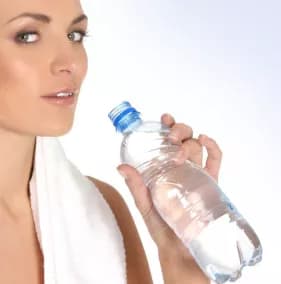Water is the most critical element of the human body. Its existence provides a vital role in the function of cells. These functions include removal of waste products, carrying nutrients, preservation and regulation of body temperature through sweating, lubrication of body tissues and joints, regulation of blood circulation and pressure, and assistance in digestive processes. With a majority of the body’s composition being water, it is impossible for the body to survive without it.
When you exercise, your body experiences an elevation in body temperature, which is reliant on the length and intensity of the workout, clothing worn, environmental conditions, and metabolic rate. To eliminate this heat from your body, it is excreted through sweat. Sweat is predominantly composed of water and electrolytes like sodium.
Vigorous exercise can result in significant water and electrolyte loss from the body, leading to dehydration. However, large variation exists from person to person in respect to sweat loss. Therefore, fluid and electrolyte needs for each individual vary as well. If the water and electrolytes lost after workout are not replaced, you will experience a decrease in functioning, and it will have an unfavorable effect on your health.
Dehydration is the negative result of not drinking enough water, as the loss of fluids and salts essential to sustain regular body function are depleted. The negative effects of hydration include loss of coordination, muscle fatigue, failure to regulate body temperature, decreased energy, and heat illness. Your body can recognize that it is dehydrated and use thirst as a signal. You should drink water throughout the day, never waiting until you feel thirsty.
It is essential to evaluate your hydration status before you plan to exercise. A weight scale should be used in the morning after urinating to check your weight. This measurement will be helpful when determining total fluid loss after your physical activity. It is recommended by the American College of Sports Medicine to consume 16-20 ounces of water, or a sports beverage, at least 4 hours prior to exercising. In addition to this, 8-12 ounces of water should be consumed about 10 minutes prior to exercise. During exercise, it is also recommended to drink 3-8 ounces of water, every 15-20 minutes that you exercise. If you are exercising for more than an hour, choose a sports beverage that contains 5-8% carbohydrates with electrolytes.
Post exercise, you should check your weight on a scale to approximate your fluid losses. Within two hours after your workout has ended, you should drink 20-24 ounces of water, or sports beverage for every pound lost.
A study was published at Loughborough University in 2005 to understand the environmental impacts on hydration and exercise performance. It was discovered that some individuals are able to tolerate water losses amounting to 2% of body mass due to sweating without substantial risk to their physical health or performance, when their environment is cold or temperate. Conversely, they found that when exercising in a hot environment, a 2% body mass loss impaired the individual’s workout performance and heightened the probability of suffering a heat injury. This study was substantial for highlighting the importance of monitoring one’s body mass loss, as the environment can play a huge role in turning an exercise routine into a health hazard.
According to an evaluative study published in the journal Nutrition, sustaining proper hydration before, during, and after exercise will assist in reducing fluid loss, uphold performance, lower maximum heart rate, sustain plasma volume, and reduce heat stress, heat exhaustion, or even heat stroke. Do talk to a healthcare professional if you feel you are experiencing dehydration due to exercise. He or she will be able to help you determine your fitness hydration needs and provide you with information about preventing these negative effects from occurring. It is best to understand the importance of water intake and develop a proper hydration strategy in order to avoid decreased performance and lessen your risk for other health concerns.
References:
Shirreffs, SM. The Importance of Good Hydration for Work and Exercise Performance. Nutrition Reviews. 2005;63(s1):S14-S21.
Simpson MR, Howard T. Selecting and Effectively Using Hydration for Fitness [brochure]. American College of Sports Medicine; 2011.
Von Duvillard SP, Braun WA, Markofski M, Beneke R, Leithauser R. Fluids and hydration in prolonged endurance performance. Nutrition. 2004;20(7-8):651-656.
Helpful Peer-Reviewed Medical Articles:
Sharp, R. L. (2007). Role of whole foods in promoting hydration after exercise in humans. Journal of the American College of Nutrition, 26(sup5), 592S-596S.
Shirreffs, S. M. (2009). Hydration in sport and exercise: water, sports drinks and other drinks. Nutrition Bulletin, 34(4), 374-379.
Serwah, N., & Marino, F. E. (2006). The combined effects of hydration and exercise heat stress on choice reaction time. Journal of Science and Medicine in Sport, 9(1), 157-164.
Maughan, R. J. (2012). Investigating the associations between hydration and exercise performance: methodology and limitations. Nutrition reviews,70(suppl 2), S128-S131.
Judelson, D. A., Maresh, C. M., Farrell, M. J., Yamamoto, L. M., Armstrong, L. E., Kraemer, W. J., ... & Anderson, J. M. (2007). Effect of hydration state on strength, power, and resistance exercise performance. Medicine and science in sports and exercise, 39(10), 1817.
Maresh, C. M., Gabaree-Boulant, C. L., Armstrong, L. E., Judelson, D. A., Hoffman, J. R., Castellani, J. W., ... & Casa, D. J. (2004). Effect of hydration status on thirst, drinking, and related hormonal responses during low-intensity exercise in the heat. Journal of Applied Physiology, 97(1), 39-44.
Related Articles
Test Your Knowledge
Asked by users
Related Centers
Related Specialties
Related Physicians
Related Procedures
Related Resources
Join DoveHubs
and connect with fellow professionals


0 Comments
Please log in to post a comment.